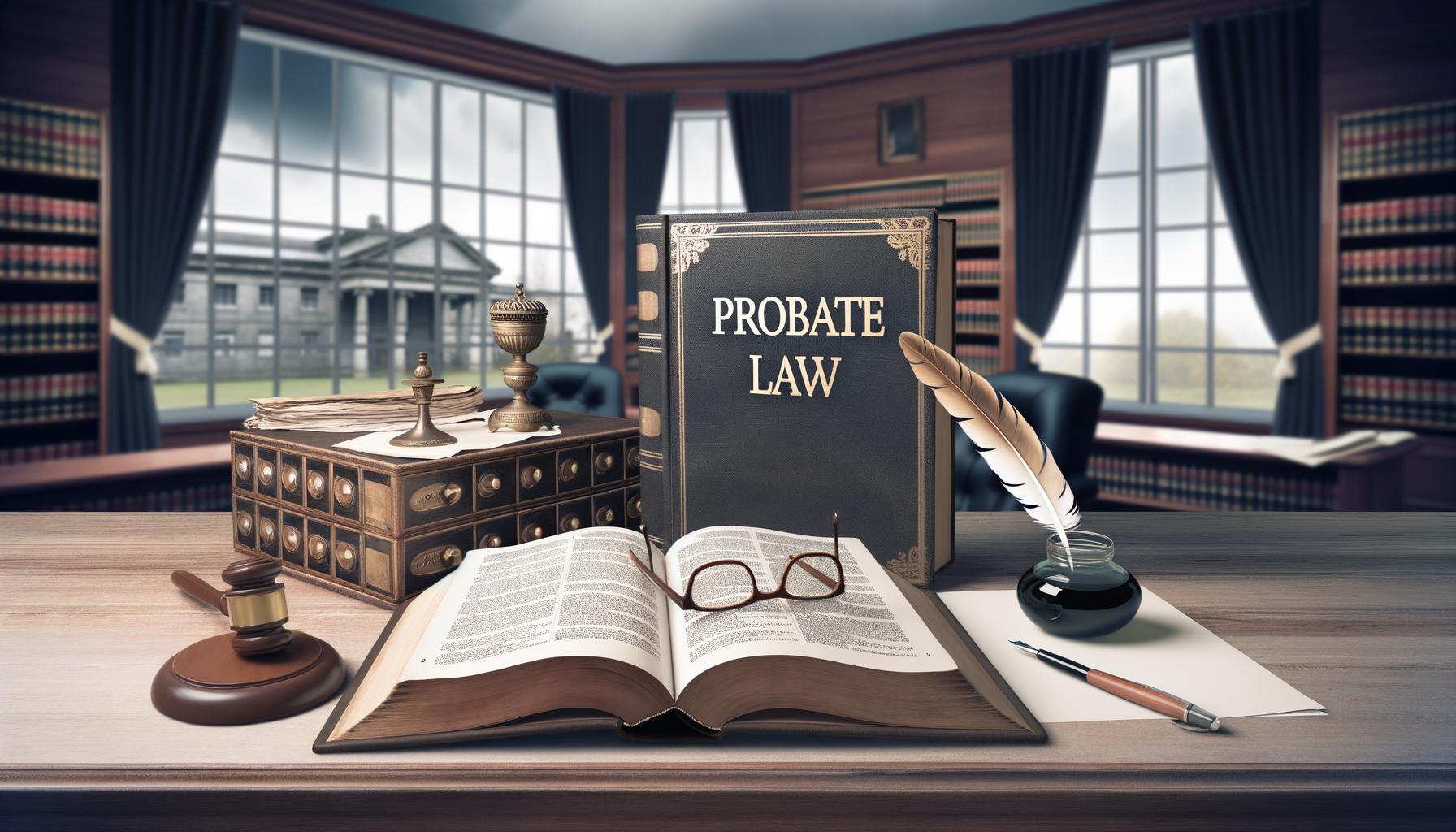Probate law governs the process of administering a deceased person’s estate, ensuring that assets are distributed according to the individual’s will or state law if no will exists. Understanding probate law is crucial for effective estate planning, as it helps prevent disputes and ensures a smoother transition of assets to heirs and beneficiaries.
In San Juan Capistrano, probate law follows specific procedures and guidelines designed to honor the decedent’s wishes while protecting the rights of all parties involved.
The probate process can seem labyrinthine, but its importance cannot be overstated. Without proper legal guidance, an estate can languish in legal limbo, leading to unnecessary expenses and emotional strain on loved ones. Whether you’re drafting a will or planning your estate in San Juan Capistrano, it’s essential to grasp how probate works locally. From filing necessary documents to navigating court proceedings, having a clear understanding of this legal area can make all the difference.
In San Juan Capistrano specifically, probate adheres to California state laws but also incorporates local nuances that may impact timelines and procedural requirements. It’s not merely about dividing assets; probate involves validating wills, settling debts, and satisfying tax obligations. By familiarizing yourself with these elements early on, you provide peace of mind not just for yourself but also for your future heirs and beneficiaries.
The Probate Process in San Juan Capistrano
Step-by-Step Guide Through the Probate Process
Understanding the probate process in San Juan Capistrano is essential for anyone managing an estate. The first step involves identifying and gathering all of the decedent’s assets, such as bank accounts, real estate, and personal possessions. Next, a petition to open probate must be filed with the Orange County Superior Court, which has jurisdiction over San Juan Capistrano. This includes submitting pertinent documents like the death certificate and any existing will.
Once probate is opened, the court appoints an executor or administrator to manage the estate. Their role includes notifying creditors and heirs of the probate proceedings, inventorying and appraising assets, paying debts and taxes owed by the estate, and distributing remaining assets to beneficiaries as specified in the will or by state law if no will exists. Each stage requires thorough documentation to ensure compliance with California’s complex probate law.
Key Documents Required for Probate
Certain key documents are necessary to navigate through the probate process efficiently. First and foremost is the original will if one exists; copies alone are not sufficient. Additionally, certified copies of the death certificate must be provided along with detailed lists of all known assets and their valuations. Beneficiary notifications must also be prepared and sent out promptly according to legal requirements.
Financial records are equally crucial during this process; they include previous tax returns, bank statements, insurance policies, and records of outstanding debts or loans. All these documents play significant roles in presenting a transparent account of the deceased’s estate before it can be legally distributed among beneficiaries.
Duration and Common Timelines Associated With Probate Cases
The duration of a probate case in San Juan Capistrano can vary widely based on factors such as estate complexity, size, any challenges from beneficiaries or creditors, and fulfilling requisite legal endorsements stipulated under California probate law. On average though, simple cases might take anywhere from six months to a year; more complicated estates could take longer.
It’s important for executors and administrators to understand these timelines at outset so they can set accurate expectations with all involved parties. Frequent delays arise due to incomplete paperwork or disputes among heirs that require mediation or litigation – emphasizing again why meticulous preparation cannot be understated when entering this critical phase after losing loved ones in our lives here within beautiful coastal confines we call home – San Juan Capistrano.
Roles and Responsibilities in Probate Court
In the probate court of San Juan Capistrano, the roles and responsibilities of involved parties are clear but multifaceted. The probate court plays a crucial role in ensuring that a deceased person’s estate is settled according to both legal requirements and the wishes expressed in their will.
It oversees the process from beginning to end, addressing any disputes or issues that may arise. The court ensures legal adherence by verifying documents, validating wills, and formally appointing Executors or Administrators to carry out essential duties.
The Executor or Administrator, often named in the decedent’s will, has many responsibilities during probate proceedings. They must collect assets, pay debts and taxes, and distribute the remaining estate to beneficiaries as outlined in the will.
This role requires exceptional diligence and trustworthiness since it involves managing financial accounts, real properties, personal belongings, and various other aspects of an estate. In situations where no will exists-or when an Executor is not specified-the court appoints an Administrator to fulfill these critical duties (also known as Probate Law‘s unsung heroes).

For heirs and beneficiaries, understanding their rights within the probate process is vital for ensuring that they receive what they are entitled to under the will. They have a right to be kept informed about progress in settling the estate and may need to participate actively if disputes arise over asset distribution or validity of claims against the estate. Ensuring all parties remain well-informed can mitigate conflicts and streamline proceedings:
- Request regular updates: Beneficiaries should ask Executors for regular status reports.
- Verify distributions: Make sure distributed assets align with stipulations in the will.
- Seek legal counsel: If disagreements occur, professional advice can help resolve issues efficiently.
Through understanding these roles-whether you’re an Executor/Administrator fulfilling specific duties or an heir safeguarding your interests-you contribute significantly towards a smooth probate process that respects both legal frameworks and individual wishes.
Common Challenges and How to Overcome Them
Disputes Among Heirs and Beneficiaries
One of the most common challenges in probate law is dealing with disputes among heirs and beneficiaries. These disputes can stem from unclear language in the will, perceived favoritism, or disagreements over asset distribution.
To manage such conflicts, it’s essential for the executor or administrator to communicate openly and transparently with all involved parties. Mediation can be a useful tool in these situations; a neutral third party can help facilitate discussions and negotiate agreeable solutions without the need for prolonged litigation.
Contested Wills
A contested will often leads to delays and additional legal expenses. This challenge arises when someone believes that the will does not accurately reflect the decedent’s true wishes, possibly due to undue influence, lack of mental capacity, or fraud.
To mitigate this issue, maintaining thorough documentation that evidences the testator’s intentions at the time of drafting their will is invaluable. Legal experts suggest periodic updates to estate planning documents to reflect any changes in circumstances as a preventive measure against potential contests.
Navigating Complex Assets
The complexity of assets within an estate can also present significant hurdles during probate. Real estate properties, business interests, international investments, and digital assets require specialized knowledge for proper management and valuation. Employing professionals such as appraisers, financial advisors, and forensic accountants is crucial for effectively navigating these complexities. Engaging a probate law attorney well-versed in local regulations specific to San Juan Capistrano ensures that all forms of assets are appropriately handled according to legal standards.
Seeking legal assistance in San Juan Capistrano is essential when dealing with these common probate challenges. Local attorneys who specialize in probate law offer valuable insight into efficient dispute resolution methods while ensuring adherence to state-specific legal guidelines. Accessing these resources early on can significantly alleviate the stress involved in managing an estate through probate court.
How to Avoid Probate
To avoid the complexities and expenses associated with probate law, many individuals in San Juan Capistrano are turning to various estate planning strategies. One of the most effective methods is setting up a trust.
By placing assets into a trust, you can ensure they pass directly to the beneficiaries without going through probate. Living trusts are particularly popular because they allow you to retain control over your assets during your lifetime and specify how they should be distributed after your death.
Another way to circumvent probate is through joint ownership of property. When property is jointly owned with rights of survivorship, it automatically transfers to the surviving owner upon one owner’s death. This method is commonly used for real estate, bank accounts, and other significant assets. However, it’s important to understand that this strategy requires careful consideration as it can have tax implications and potential risks if not properly managed.
A third approach involves designating beneficiaries for various accounts and insurance policies. Many retirement accounts, life insurance policies, and even some bank accounts allow you to name a beneficiary who will receive the asset directly upon your passing. This designation overrides any instructions in a will concerning these particular assets, providing a straightforward way for loved ones to gain access without undergoing probate court proceedings.
| Strategy | Description |
|---|---|
| Living Trust | A legal arrangement that allows you to control your assets during your lifetime and specify their distribution posthumously. |
| Joint Ownership | Property ownership structure where rights of survivorship ensure direct transfer to surviving owners. |
| Beneficiary Designations | Direct allocation of specific accounts or policies to chosen beneficiaries, bypassing probate entirely. |
While these strategies offer clear advantages in terms of efficiency and cost-effectiveness, they also come with their own sets of pros and cons that need careful consideration. For instance, setting up a living trust can be more expensive upfront than simply writing a will but often saves considerable time and money by avoiding probate proceedings down the line. Joint ownership simplifies asset transfer but may expose assets to creditors’ claims against either owner.

Prospective tools like payable-on-death (POD) designations for bank accounts or transfer-on-death (TOD) deeds for real estate are also worth exploring. These tools function similarly by allowing named beneficiaries immediate access upon an individual’s death while sidestepping probate law requirements altogether.
Employing these strategic approaches makes it possible not only to ease the burden on your heirs but also ensures more seamless management of your estate in accordance with your wishes.
Costs Involved in the Probate Process
When navigating the probate process in San Juan Capistrano, understanding the potential costs involved is crucial for estate planners and beneficiaries. Probate law outlines various fees and expenses that can add up quickly, impacting the overall value of the estate. These costs typically include court fees, attorney fees, executor fees, appraisal fees, and other administrative expenses.
Court fees are one of the first expenses encountered in the probate process. In California, these fees are structured based on the gross value of the estate and can range from a few hundred to several thousand dollars. Additionally, filing fees for various documents and petitions will be required as the case progresses through probate court.
| Estate Value | Attorney Fees |
|---|---|
| $100,000 | $4,000 (4%) |
| $200,000 | $7,000 (3% for amount over $100K) |
| $1 million | $23,000 (2% for amount over $800K) |
Aside from legal representation costs under probate law guidelines, executor compensation must also be taken into account. Executors or administrators are entitled to a fee for their services which is calculated similarly to attorney fees-usually a set percentage of the estate’s value. Other miscellaneous costs might include appraisal fees to determine property values accurately or bond premiums if posting a bond is required by the court.
For those looking to minimize these expenses in San Juan Capistrano, it’s advisable to maintain well-documented records and consider alternative estate planning methods like living trusts which bypass many traditional probate processes altogether. Being aware of these potential costs allows involved parties to make informed decisions and better manage financial expectations during what can already be an emotionally taxing time.
Recent Changes in Probate Law in California
In recent years, several notable changes have taken place in California probate law, significantly impacting residents of San Juan Capistrano. One of the primary updates is the modification to the threshold for small estate administration. The amount has been increased from $150,000 to $166,250, allowing more estates to bypass formal probate procedures. This change can expedite the process and reduce costs for smaller estates, making it less cumbersome for families dealing with a loss.
Another significant legislative update pertains to electronic wills and remote witnessing. As digital lifestyles become more prevalent, California has begun adapting its laws to accommodate these modern practices. Although electronic wills are still a developing area of probate law in California, there has been movement towards allowing certain types of digital signatures and documents under specific conditions. This shift can help streamline the probate process by providing greater convenience and accessibility for estate planning.
Additionally, recent changes have emphasized protecting vulnerable individuals through stricter regulations on financial elder abuse. These new provisions include enhanced penalties for those found guilty of exploiting elderly or dependent adults and improving reporting mechanisms to swiftly address such issues. For residents in San Juan Capistrano planning their estates or serving as executors or administrators, being aware of these protective measures is crucial to ensuring that their loved ones remain safeguarded against potential abuses during the probate process.
Local Resources and Legal Assistance
When navigating the complexities of probate law in San Juan Capistrano, it is essential to have access to local resources and legal assistance. Fortunately, residents have several options to choose from when seeking professional guidance. A list of reputable probate attorneys and law firms specializing in estate planning can be immensely helpful.
Here are a few well-regarded local probate attorneys and law firms:
- Law Office of James F. Roberts & Associates: Known for their comprehensive approach to estate planning and probate cases.
- Mortensen & Reinheimer, PC: Specializes in trust administration and probate litigation.
- Penrose Chun & Gorman LLP: Offers extensive experience in handling contested wills and complex estate matters.
Beyond legal professionals, local community resources can also provide valuable support during the probate process. Various organizations offer educational workshops, support groups, and counseling services tailored to individuals dealing with estate planning and loss.
Case Studies
One noteworthy probate case from San Juan Capistrano involved the estate of a local business owner, Mr. Thomas Westfield. When Mr. Westfield passed away without a will, his family faced numerous challenges navigating probate law in California. As there was no designated executor, the court appointed an administrator to manage the estate.
This individual had to identify and inventory all of Mr. Westfield’s assets, a task complicated by the existence of multiple business interests and properties spread across different counties. The process highlighted how crucial it is for individuals to have clear estate planning documents to ensure their assets are handled according to their wishes and to mitigate potential familial conflicts.

Another interesting case featured Mrs. Eleanor Jones, who had prepared a comprehensive estate plan including both a will and several trusts aimed at circumventing probate entirely. Despite her efforts, unforeseen complications arose when distant relatives contested the legality of one trust on grounds that Mrs. Jones lacked the mental capacity when she signed the papers.
The prolonged legal battle emphasized two key points: first, ensuring all documents are legally sound and second, understanding that even well-prepared estates might face disputes requiring probate court intervention.
In contrast with these challenging cases, the Henderson family’s experience showcases how proactive measures can ease the probate process significantly. Before Mr. Robert Henderson’s passing, he meticulously worked with his attorney to create an extensive estate plan integrating various tools like joint ownership for major assets and payable-on-death designations for bank accounts.
Once he passed away, these actions ensured that most of his wealth bypassed probate altogether, allowing his heirs quick access without incurring significant legal fees or waiting periods typically associated with probate proceedings in San Juan Capistrano.
These real-life examples underscore diverse scenarios within probate law wherein thorough knowledge and effective legal planning make substantial differences in outcomes for families dealing with estate settlements in San Juan Capistrano.
Conclusion
Understanding probate law in San Juan Capistrano is crucial for anyone looking to secure their estate planning and ensure a smooth transition of assets. From comprehending the detailed step-by-step probate process to recognizing the roles and responsibilities within the probate court, we’ve delved into every facet that individuals might encounter. The local nuances, including recent changes in probate law, emphasize the importance of staying informed and prepared.
Planning ahead means more than just avoiding potential legal pitfalls; it’s about safeguarding your loved ones from future disputes and financial burdens. This involves not only knowing how to navigate common challenges but also employing legal strategies to potentially avoid probate altogether. Utilizing tools such as trusts, joint ownerships, and thorough documentation can significantly ease the transition process upon one’s passing, making it essential to educate oneself early on these options.
In conclusion, proactive estate planning is an investment in peace of mind for both you and your family. While navigating through San Juan Capistrano’s specific probate laws may seem complicated, numerous local resources are available to assist you.
Consulting with experienced probate law attorneys will provide personalized advice tailored to your circumstances. By taking these steps now, you ensure that your affairs are handled according to your wishes, providing clarity and security for your heirs during what can be a challenging time.
Frequently Asked Questions
What Is the Probate Process in California?
The probate process in California involves validating a deceased person’s will, appraising their estate, paying off debts and taxes, and distributing the remaining assets to beneficiaries. It begins with filing a petition in the local probate court and, if there’s a will, proving its validity.
An executor or personal representative is appointed to manage these tasks. This process can be time-consuming and costly but ensures that assets are distributed according to the deceased’s wishes.
Why Do I Need Probate?
Probate is necessary to settle an estate legally and ensure that debts and taxes are paid before distributing assets to beneficiaries. It provides a formal way to resolve any disputes concerning the deceased’s estate or claims from creditors. Without probate, there might be confusion or conflict among heirs, creating legal complications that could delay the distribution of assets significantly.
What Is the Probate Law in the United States?
Probate law in the United States varies by state but generally requires the court-supervised administration of a deceased person’s estate. Its purpose is to validate wills, settle debts, and distribute assets under state laws and within legal protocols.
Though each state has distinct procedures, they typically involve appointing executors or administrators who carry out these responsibilities while adhering to legal guidelines designed to protect all parties involved.
How Do I Avoid Probate in California?
Avoiding probate in California can be accomplished through several strategies aimed at simplifying asset transfer upon death without court intervention. Setting up living trusts allows assets to bypass probate as they are controlled by trust documents rather than a will.
Joint ownership with rights of survivorship also ensures direct transfer of property upon death. Another method includes naming beneficiaries directly on accounts like retirement plans and life insurance policies, which facilitates immediate transfer.
Do All Wills in California Have to Go Through Probate?
Not all wills in California must go through probate; smaller estates may qualify for simplified procedures that bypass formal probate entirely under certain conditions. If an estate’s total value falls below California’s threshold for small estates—currently set at $166,250—the beneficiary can settle matters using simplified affidavit processes rather than full court administration.
Additionally, specific types of properties owned jointly or held in trust may also avoid probate despite having been designated within a will.

